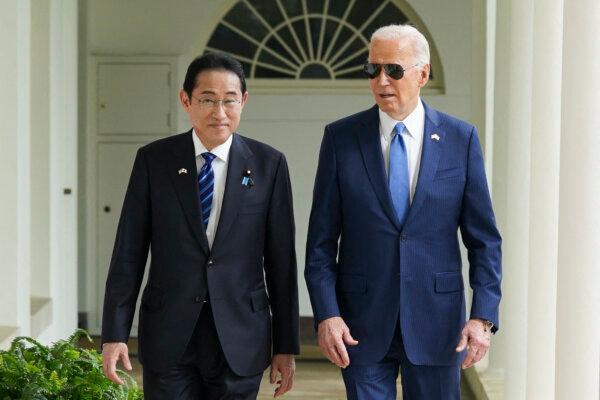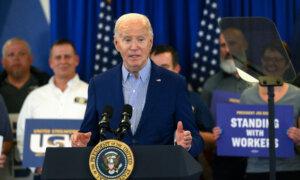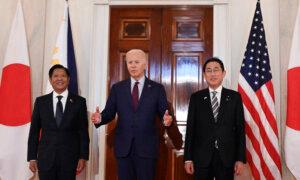President Joe Biden said that Japan, along with three other countries, was struggling economically due to its refusal to accept immigrants.
The Japanese embassy on Friday rejected President Joe Biden’s recent comments that labeled Japan—along with three other countries—as “xenophobic,” calling the president’s remarks “unfortunate.”
At a Washington fundraising event on May 1, President Biden grouped U.S. allies Japan and India with U.S. adversaries China and Russia, saying their economic challenges arise from their refusal to accept immigrants.
“You know, one of the reasons why our economy is growing is because of you and many others. Why? Because we welcome immigrants,” the U.S. leader remarked at the event.
“Look, think about it. Why is China stalling so badly economically? Why is Japan having trouble? Why is Russia? Why is India? Because they’re xenophobic. They don’t want immigrants,” he added.
The Japanese embassy has refuted his comments, saying that it was “unfortunate that some of the comments were not based on an accurate understanding of Japan’s policies,” Politico reported.
“We have raised this point to the U.S. government and explained Japan’s positions and policies once again,” the embassy told the news outlet.
White House Press Secretary Karine Jean-Pierre later clarified that the president’s intention was to convey a broader message that the United States is “a nation of immigrants.”
“We are stronger for it because of the fact that in our DNA we are a nation of immigrants,” Ms. Jean-Pierre told reporters, adding that she believes “most leaders and allies across the globe” would understand the broader case behind President Biden’s remarks.
Japan said it acknowledged the U.S. clarification that President Biden’s comment “was not made with the intent of undermining the importance and permanence of the Japan-U.S. relationship.”
 U.S. President Joe Biden and Japanese Prime Minister Fumio Kishida walk along the colonnade to the Oval Office of the White House in Washington, on April 10, 2024. (Kevin Lamarque /POOL/AFP via Getty Images)
U.S. President Joe Biden and Japanese Prime Minister Fumio Kishida walk along the colonnade to the Oval Office of the White House in Washington, on April 10, 2024. (Kevin Lamarque /POOL/AFP via Getty Images)His remarks come just a month after Japanese Prime Minister Fumio Kishida made an official visit to Washington in early April, during which the leaders discussed deepening cooperation between their countries in defense and security, and other sectors.
During a state dinner with Mr. Kishida, President Biden said the United States and Japan share “the same hopes, the same values, the same commitment to democracy and freedom and to dignity for all.”
The White House stated that the countries’ militaries will cooperate with a joint command structure and they will, together with Australia, develop a new air missile defense network.
“As our two countries look to ensure a secure and peaceful region, the United States and Japan plan to conduct deterrence operations to address escalatory or provocative activities around Japan,” it stated.
The United States and its allies, including Japan, have been bolstering their militaries to counter what they see as a growing threat from China in the South China Sea and the East China Sea.
This is not the first instance of President Biden characterizing China as xenophobic. He made a similar comment about Beijing during his visit to United Steelworkers headquarters in Pennsylvania on April 17.
“When I meet other world leaders, I say, ‘Would you trade places with China? Would you trade places with their problems?’ They’ve got a population that is more people in retirement than working,” he said. “They’re xenophobic—nobody else coming in. They’ve got real problems.”
The remarks, among the harshest criticisms of the communist country yet from the administration, came as China continues to grapple with an ongoing property crisis, weak domestic demand, and mounting local government debt. China’s economic challenges at home contribute to an influx of low-priced Chinese goods to international markets, an issue that is increasingly raising eyebrows in the West.
Eva Fu and Reuters contributed to this report.














 English (US) ·
English (US) ·  Turkish (TR) ·
Turkish (TR) ·